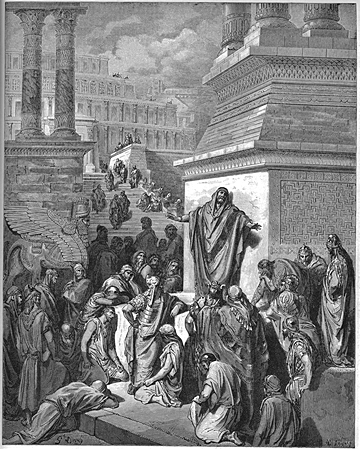Jonah 3
1 Then Yahweh said to Jonah again,
Yehowa ƒe nya va na Yona zi evelia be,
2 “Go to that great city of Nineveh, and tell them the message that I gave you [previously].”
“Yi ɖe Ninive, du gã ma me, eye nàɖe gbeƒã nya siwo megblɔ na wò la na wo.”
3 So [this time] Jonah obeyed Yahweh, and he went to Nineveh. That city was so big that a person [had to walk] for three days to completely [go through] it.
Ale Yona ɖo to Yehowa ƒe gbe azɔ, eye wòyi Ninive. Ninive nye du gã aɖe si woatsɔ ŋkeke etɔ̃ hafi azɔ ato eme.
4 On the first day [after] Jonah [arrived], he [began walking] through the city. He was proclaiming (OR, At the end of that day he started proclaiming) to the people, “Forty days from now, Nineveh will be destroyed {[God] will destroy Nineveh}!”
Yona ge ɖe du la me hezɔ ŋkeke ɖeka nɔ gbeƒã ɖem be, “Esusɔ ŋkeke blaene ne woagbã Ninive du la!”
5 The people of Nineveh believed God’s [message]. They [all] decided that everyone should begin (fasting/abstaining from food). So [everyone], including important people and unimportant people, [did that]. They [also] put on coarse cloth, [to show that they were sorry for having sinned].
Ame siwo le Ninive dua me la xɔ Mawu dzi se; woɖe gbeƒã nutsitsidɔ, eye ame sia ame, tsitsiawo kple ɖeviwo siaa ta akpanya.
6 The King of Nineveh heard [what the people were doing]. [So] he took off his royal robes, and [he also] put on coarse cloth. He left his palace, and sat down where there were [cold] ashes, [to show that he also was sorry for having sinned].
Esi Ninive fia se Yona ƒe mawunya la, eɖi le eƒe fiazikpui dzi, ɖe eƒe fiawuwo da ɖi, eye wòta akpanya henɔ anyi ɖe dzofi me.
7 Then he sent messengers to proclaim to [the people in] Nineveh: “My advisors and I have decreed that no one may eat or drink anything. Do not even allow your animals to eat or drink.
Fia la na woɖe gbeƒã le Ninive dua me be: “Fia kple eƒe dumegãwo de se be: “Amegbetɔ alo lã, nyi alo alẽ aɖeke maɖu nu o. Womana nuɖuɖu alo tsi wo o.
8 Instead, every person must put on coarse cloth. [Put coarse cloth on] your animals, [too]. Then everyone must pray fervently to God. And everyone must stop doing evil actions/things, and stop acting violently [toward others].
Amegbetɔwo kple lãwo siaa ata akpanya, woafa avi vevie na Mawu, woatrɔ le woƒe mɔ vɔ̃wo dzi, eye woaɖe asi le vɔ̃ɖivɔ̃ɖi ŋuti.
9 Perhaps, [if everyone does that], God may change his mind and be merciful [to us], and stop being very angry with us, with the result that we will not die.”
Ɖewohĩ, Mawu ate ŋu aɖo be míatsi agbe, eye wòaɖo asi eƒe dziku helĩhelĩ la dzi be wòagatsrɔ̃ mí o.”
10 When they [all did that], God saw what they were doing, and he saw that they had stopped doing evil things. So [he pitied them, and] he did not get rid of them as he had threatened to do.
Ke esi Mawu kpɔ be woɖe asi le woƒe mɔ vɔ̃wo ŋuti la, eɖe asi le ɖoɖo si wòwɔ be yeatsrɔ̃ wo la ŋu, eye wòtsɔe ke wo.





















